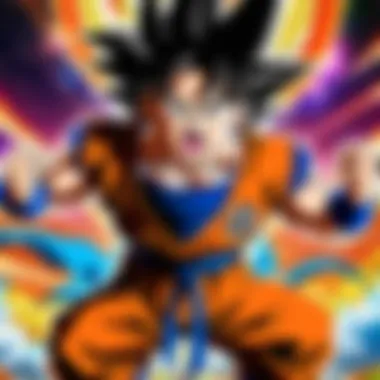In-Depth Look at the Dragon Ball Super English Dub


Prologue to the Series
Dragon Ball Super is a continuation of the iconic Dragon Ball franchise, originally created by Akira Toriyama. The series began airing in July 2015 and ran until March 2018, comprising a total of 131 episodes. It is categorized as action-adventure and science fiction, maintaining the longstanding tradition of its predecessors while introducing new elements to keep the storyline fresh.
This anime follows the adventures of Goku and his friends as they face powerful foes and explore the universe. With its balance of intense battles and humor, Dragon Ball Super has managed to captivate both long-time fans and new audiences alike. This series builds upon the events of Dragon Ball Z, offering deeper insights into the characters and their development.
The reception of Dragon Ball Super has been mostly positive. Fans appreciate the engaging action and humor, while critics have lauded its animation quality and storytelling. However, some viewers have noted that it takes time to reach the same emotional depth as previous series. Overall, the franchise continues to hold a significant place in the anime landscape, highlighting its cultural and commercial impact.
Staff and Cast Details
The success of Dragon Ball Super can be attributed to a talented team who worked diligently behind the scenes. Key figures in the production included:
- Akira Toriyama: Original creator and involved in character design.
- Toyotarou: Manga artist who adapts the anime's story into a manga format.
- Kimitoshi Yamaguchi: Director for many of the episodes, ensuring a seamless flow to the narrative.
The voice cast plays a critical role in bringing the characters to life. Notable voice actors include:
- Sean Schemmel as Goku
- Christopher Sabat as Vegeta
- Laura Bailey as Bulma
- Kyle Hebert as Gohan
Behind the scenes, numerous animators and sound technicians contributed significantly to the overall sound and visual experience of the series. These professionals enhanced the performance of the narrative through their skills and creativity.
Theme Music Analysis
The theme music of Dragon Ball Super features distinct opening and ending songs that have resonated with fans. The opening theme, "Chōzetsu Dynamic!", performed by Kazuya Yoshii, sets the tone for each episode, embodying the show's energetic spirit. Meanwhile, the ending themes often reflect the emotional arc of the episodes.
The musicians and composers involved, such as Norihito Sumitomo, crafted an engaging score that not only complements the action but enriches the storytelling experience. The thematic elements present in the music align well with the series, emphasizing friendship, battles, and personal growth.
Plot Summary and Analysis
Dragon Ball Super explores several significant arcs, including the Battle of Gods, Resurrection 'F', Universe 6, Future Trunks, and the Tournament of Power. Each storyline introduces diverse characters and challenges that Goku and his friends must face. The series examines themes of perseverance, friendship, and the nature of strength.
The storytelling is often highlighted by unexpected plot twists and character conflicts. Central to the narrative is Goku's never-ending desire to become stronger, which drives much of the action. The plot is engaging, but it has met with varied reactions regarding pace and depth of character development compared to earlier works.
Reception and Impact
Critics and fans alike have reviewed Dragon Ball Super positively. It holds a significant place in the anime community, marking a return of one of the most beloved franchises in modern culture. Viewer ratings often reflect a balance between nostalgia for the original series and appreciation for the advancements made.
In cultural terms, Dragon Ball Super’s legacy has proven to be substantial. The series introduced new characters and battles that expanded the universe of Dragon Ball. The discussions and comparisons with other anime series often emphasize its unique contributions while acknowledging its roots in earlier storylines.
Overall, Dragon Ball Super has left an indelible mark on the anime world, demonstrating both the evolution of storytelling in the franchise and its relevance in today’s global entertainment landscape.
Intro to Dragon Ball Super Dub
The English dub of Dragon Ball Super represents a fascinating intersection of cultural adaptation and audience engagement. This section emphasizes the significance of the dub in expanding the franchise's reach and impact beyond Japan. Not only does it cater to a different language audience, but it also adds layers of interpretation that can shape viewers' understanding of the characters and narrative. Understanding the dub is crucial for fans who are interested in how the original content adapts to fit a new cultural context while maintaining the core essence that has made Dragon Ball a global phenomenon.
Background of the Franchise
Dragon Ball, created by Akira Toriyama, originally began as a manga serialized in Weekly Shōnen Jump in 1984. Its success led to various adaptations, including anime series, movies, and merchandise. Dragon Ball Super, which debuted in 2015, is positioned as a continuation of the story after Dragon Ball Z. The series revived the franchise, introducing new characters, story arcs, and challenges for Goku and his companions. The reception in Japan was positive, creating anticipation for the English dub as part of the franchise's expansion.


What Makes the Dub Unique
The English dub of Dragon Ball Super distinguishes itself through several unique aspects that contribute to its appeal. Firstly, the voice actors bring their interpretations to beloved characters, often shaping how a character is perceived. For instance, the portrayal of Goku by Sean Schemmel adds a different energy than Masako Nozawa’s original performance.
Another unique element is the adaptation processes, where humor and cultural references are adjusted for the target audience. This allows the show to resonate with viewers who might not grasp the original subtleties present in the Japanese version. Moreover, certain scenes may undergo changes to align with Western sensibilities, making the content more palatable without losing the essence of the story.
In summary, the English dub plays a significant role in the Dragon Ball franchise, contributing to its enduring popularity and cultural relevance.
Production Aspects of the English Dub
The production aspects of the English dub of Dragon Ball Super play a crucial role in shaping the overall experience for the audience. This section aims to delve into the various elements that contribute to the unique qualities of the dub. The way the series is adapted for English-speaking viewers impacts not only the fidelity to the original content but also the reception among fans. Understanding the production nuances helps in appreciating the efforts that go into bringing the anime to life in a different language.
Roles of Adaptation and Direction
In the creation of the English dub, the roles of adaptation and direction are vital. Adaptation involves translating the original scripts while capturing the essence and humor intended by the creators. This task requires skilled translators and writers who understand the cultural nuances of both the source material and the target audience. Directors oversee the voice recording sessions, guide voice actors, and ensure the performances resonate with the show's energy.
The flexibility in adapting jokes and cultural references is essential. For instance, some cultural elements may not be understandable to an English-speaking audience. Hence, writers often alter these parts to keep the humor intact while making it relatable. The balance between staying true to the original and modifying content for better understanding is a delicate task that can define the success of the dub.
Studio Involvement
Several studios have participated in the production of Dragon Ball Super's English dub. Funimation, a well-known name in the anime industry, has been the primary studio responsible for bringing this series to audiences in the USA. Their experience with anime dubbing contributes significantly to the quality of the work produced. The studio’s involvement includes casting, recording, and post-production processes.
Funimation collaborates closely with voice actors and directors to ensure the final product meets expectations. Their commitment to quality is evident in the casting choices and the attention to detail during the voice recording sessions. This collaboration ultimately influences how the series is perceived by the audience.
Script Adaptation Challenges
Adapting scripts for the English dub comes with numerous challenges. One major hurdle is keeping the timing of dialogue aligned with the characters' lip movements. This synchronization is particularly important in anime, where visual elements are striking and must match the audio seamlessly.
Moreover, some expressions and idioms in Japanese do not have direct translations in English. This forces adaptation teams to find creative solutions to convey the same message while respecting the original intent. Such challenges require careful consideration and constant communication between translators, writers, and directors.
In summary, the intricate process of producing the English dub of Dragon Ball Super reveals a complex interplay of adaptation and direction, studio involvement, and the hurdles faced during script adaptation. These aspects are not merely technical; they reflect the dedication to making the series accessible and enjoyable for a global audience.
"The quality of a dub significantly affects viewer engagement and enjoyment, making production aspects crucial in anime release strategies."
Understanding these elements allows fans to gain a deeper appreciation for the artistry and effort involved in bringing Dragon Ball Super to life in English.
Voice Cast of Dragon Ball Super
The voice cast of Dragon Ball Super plays a crucial role in shaping the overall tone and experience of the series. Given the franchise's rich history, the actors not only bring their characters to life but also contribute to the continuity and evolution of its narrative. The performances in the English dub resonate with audiences, creating memorable engagements that define the series for many fans outside Japan. Understanding the contribution of these actors enhances one’s appreciation of the production.
Key Voice Actors
The characters in Dragon Ball Super are portrayed by a talented group of voice actors. Notable figures include:
- Sean Schemmel as Goku: Schemmel has embodied Goku for decades. His performance captures Goku’s innocence, determination, and depth, making him an integral aspect of the franchise.
- Christopher Sabat as Vegeta: Sabat's voice lends Vegeta a mix of arrogance and complexity. His delivery adds significant layers to the character's development throughout the series.
- Eric Vale as Trunks: Vale narrates Trunks’ journey with emotional weight, intentionally reflecting the character’s struggles and growth.
- Laura Bailey as Chi-Chi: Bailey brings Chi-Chi’s fierce yet nurturing personality to the forefront, enhancing her dynamics with Goku and their family.
- Kyle Hebert as Gohan: Hebert's portrayal signifies Gohan's evolution from a timid boy to a mature warrior with depth.
The collective talent results in a performance that aligns well with the visually dynamic and action-packed format of the series, thus playing a pivotal role in its storytelling.
Character Interpretations


Each voice actor brings their unique interpretation to the characters, often based on their understanding of the source material. These interpretations can significantly differ from the original Japanese voices. In the English dub, actors often emphasize a more Western approach, capturing cultural nuances that may resonate more with the audience in the United States.
For instance, Vegeta's portrayal by Sabat is characterized by a sharper, more arrogant tone compared to his Japanese counterpart, which emphasizes his proud warrior nature. Goku's voice, as provided by Schemmel, carries a childlike quality that may be less pronounced in Japan. Such differences not only set the English dub apart but also contribute to character relatability in a new cultural context.
Comparative Analysis with Original Voices
A comparative analysis of the English dub and the original Japanese voices reveals distinct differences in tone, emotion, and characterization. The original Japanese cast, including Masako Nozawa as Goku, tends to deliver a more nuanced performance, where subtle emotive expressions are prevalent.
Conversely, the English dub sometimes opts for a more exaggerated style. This has been praised for its energy and entertainment value, yet it also raises critiques regarding fidelity to the original character intentions. The differences in voices lead to varying audience perceptions:
- Emotional Depth: The Japanese version often conveys more emotional complexity, while the English dub may prioritize comedic timing or action-centric delivery.
- Cultural Resonance: The portrayals adapt to American cultural specifics, which can sometimes dilute the original intentions but resonate well with Western audiences.
- Fan Reception: Fan communities generally express divided opinions. Some prefer the original Japanese voices for their authenticity, while others enjoy the familiar tones of the English cast, leading to ongoing debates within the fandom.
In summary, the voice cast of Dragon Ball Super significantly impacts how viewers perceive the characters and the narrative. The unique interpretations and performances engage the audience and drive the series' popularity across different regions.
Cultural Context and Global Reception
The cultural context and global reception of the English dub of Dragon Ball Super are vital themes to explore. They highlight the interplay between localization efforts and audience interaction. Understanding this relationship assists in grasping how cultural elements shape the viewer's experience and understanding of the series.
Impact of Localization
Localization serves a crucial role in adapting Dragon Ball Super for English-speaking audiences. It goes beyond mere translation of dialogues. It involves considering cultural references, humor, and character expressions. Translators strive to make dialogue resonate with the local audience, sometimes changing nuances to ensure better relatability.
For example, phrases that hold significance in Japanese culture may not translate well directly into English. Hence, adaptors make modifications so that the content remains engaging. This can lead to differences in how scenes are perceived across cultures.
Moreover, localization informs how characters are seen. Taking into account cultural context can enhance character depth. Fans may feel a stronger connection to the story when it reflects their own culture and values. This adaptation effort is essential for global acceptance.
Reception among Fans
Fans' reception of the English dub shows a mix of enthusiasm and critique. Early reactions were often jubilant due to the return of beloved characters and the continuation of a major franchise. Many fans appreciate the voice actors, noting how they bring life to the characters. Some sentiments highlight that the English dub offers a different experience, enriching fan engagement.
However, not every response is positive. Some fans argue that certain localized elements dilute the original essence of the series. Discussions among fans on platforms like Reddit reflect these intricate sentiments. Many fans compare the dub to the original Japanese version. These discussions emphasize how tone, pacing, and expressions are often perceived differently, leading to various fan theories and interpretations.
Critiques of the English Dub
Critiques of the English dub's quality often cluster around a few recurring issues. While many appreciate the dub's effort, some listeners find fault in the adaptation. One common critique is that emotional weight is sometimes lost in translation. The subtitles often retain a level of urgency and emotional depth that could become diluted in localization.
Additionally, some fans mention inconsistencies in voice performances. While prominent voice actors deliver strong performances, there are instances where the delivery doesn't match expectations set by previous works. As a result, this can lead to a fractured immersion experience for some viewers.
"The English dub of Dragon Ball Super offers a fresh take, yet it might miss significant emotional undertones present in the original."
Overall, the English dub's cultural context and reception play a substantial role in how Dragon Ball Super is experienced around the world. Localization is crucial in making content resonate, while fan reception shapes the narrative surrounding the series. These dynamics illustrate the delicate balance required to satisfy both new and long-time fans.
Distribution and Availability
The distribution and availability of the English dub of Dragon Ball Super is central to understanding its reach and popularity. In this section, we will delve into the mechanisms of how the series is made accessible to fans around the world. This involves examining the various platforms through which the series can be streamed, as well as the physical media formats available for purchase.
Streaming Platforms


In recent years, streaming has become the predominant method for consuming media. The English dub of Dragon Ball Super can be found on several popular platforms. Notably, Crunchyroll and Funimation offer a comprehensive library for anime seekers. These platforms allow fans to watch episodes as they become available, often with simulcast options. The convenience of streaming eliminates the need for scheduled viewing, enabling immediate access to the latest episodes.
Moreover, platforms such as Hulu and Amazon Prime Video also host the series. This variety provides viewers with choices depending on their existing subscriptions. It broadens the audience, introducing Dragon Ball Super to potential fans who may not actively seek it out.
One significant benefit of these streaming services is the capability for instant updates. As new episodes are released in Japan, the English dub is made available to subscribers shortly after. This timeliness enhances the engagement of viewers, allowing for discussions and fan interactions to thrive in online communities. Without the need to wait for traditional broadcasts, fans remain more connected and invested in ongoing storylines.
Physical Media Releases
While streaming has become widely favored, physical media still plays an important role in the distribution of Dragon Ball Super's English dub. Blu-ray and DVD releases are popular among collectors and hardcore fans who prefer a tangible product. They often appreciate the extras that come with these releases, such as behind-the-scenes footage, character profiles, and exclusive artwork.
As of now, several box sets provide episodes in high definition. They are usually packed with multiple episodes per disc, making it convenient to binge-watch the series at one's pace. Retailers online, such as Right Stuf Anime and Amazon, regularly stock these items, ensuring that fans have access.
Besides, physical media caters to audiences in areas where streaming options may not be as reliable. Customers can enjoy watching the series without the need for a stable internet connection. These releases often include both the English dubbed and original Japanese-language versions, providing viewers with the opportunity to experience the series in different formats.
In summary, both streaming services and physical media release frameworks enhance the accessibility of Dragon Ball Super's English dub, paving the way for a broader audience engagement.
Comparisons to Previous Dubs
Examining the English dub of Dragon Ball Super, one must consider how it stands in relation to previous dubs in the Dragon Ball franchise. This comparison helps us understand the evolution of voice acting, localization practices, and audience expectations in the realm of anime dubbing.
Evolution of Dubbing Standards
The evolution of dubbing standards is a vital aspect when discussing Dragon Ball Super. Over the years, anime dubbing has transformed significantly to match viewers' growing expectations. In the past, translations often prioritized literal meanings over cultural nuances, leading to a disjointed viewing experience. With experts recognizing the importance of cultural context, it has become common for dubbing to convey not just the dialogue but the spirit of the content.
Today, studios employ skilled scriptwriters who adapt the narrative while keeping the characters' essence intact. Dragon Ball Super, in many ways, exemplifies this advancement. The team behind the dub methodically considered the humor, emotions, and themes present in the original Japanese version. This careful adaptation has allowed the dub to resonate well with new and long-time fans alike, showcasing the growth in dubbing quality.
Comparison with Dragon Ball Z Dub
When comparing the Dragon Ball Super dub to that of Dragon Ball Z, key differences become apparent. The most notable aspect is the shift in voice direction and production quality. The Dragon Ball Z dub faced criticism for its inconsistent voice acting and awkward dialogue at times, which sometimes detracted from its emotional impact. Conversely, Dragon Ball Super benefited from lessons learned and feedback received in the years since Dragon Ball Z was aired.
In Dragon Ball Super, the voice actors have delivered performances that feel more cohesive and relate directly to the characters' development throughout the series. This is evident in how returning actors have slightly adjusted their portrayals to reflect character growth. The dubbing team closely monitored pacing and synchronization with the visuals, resulting in a more polished product.
For viewers familiar with the previous series, this progress is especially noticeable. The engagement levels rise not just because of nostalgia but because of a more thoughtful presentation of character arcs and storylines.
Ultimately, these comparative analyses underline how the Dragon Ball franchise has adapted to meet the demands of an evolving audience, blending tradition with innovation in the rapidly growing world of anime dubbing.
Future of Dragon Ball Super Dub
The future of the Dragon Ball Super English dub holds significant importance within the context of the entire franchise. As the anime landscape continues to evolve, so does the audience's expectation for quality content and engaging narratives. The impact of the English dub on the franchise's longevity and popularity cannot be underestimated, given that many fans are accustomed to the localized versions of these iconic characters and their story arcs.
Potential Sequels and Spin-offs
Considering the immense popularity of Dragon Ball Super, the potential for sequels and spin-offs is a hot topic among fans. Given the rich lore and numerous characters, it seems plausible that the creators could explore additional narratives featuring both new and established characters. Possible sequels could delve deeper into the aftermath of the existing series, showcasing new threats or adventures that the Z Fighters must face.
Spin-offs may take a different direction, perhaps focusing on characters with less screen time or expanding the universe by introducing new elements from the Dragon Ball franchise. Projects like Dragon Ball Super: Super Hero demonstrate that there is an appetite for new stories in this universe. Addressing how future sequels and spin-offs will be dubbed in English will also require careful consideration of casting and adaptation processes to maintain the quality that fans expect.
Next Steps for the Franchise
The next steps for the Dragon Ball Super franchise must consider several key factors. First, the creators need to gauge audience interest through various platforms. Fan feedback plays a crucial role in determining what direction a new project might take. Leveraging social media platforms or fan forums on Reddit and Facebook can provide valuable insights.
Second, licensing agreements will need to be navigated efficiently to facilitate new releases on streaming platforms or physical media. With services like Funimation and Crunchyroll already distributing the content, ensuring that future projects are accessible to a global audience is critical.
Finally, consideration must be given to the overall direction of the storytelling. Balancing nostalgia with innovative narratives is key. Emphasizing character development while introducing fresh ideas can attract both long-standing fans and new viewers. This balance will shape the future of the Dragon Ball Super English dub and ensure its place in the anime community for years to come.
In summary, the future of the Dragon Ball Super dub rests not only on the continuation of the story but also on how it evolves with its audience, incorporating their feedback and expectations.















